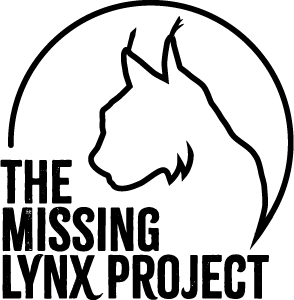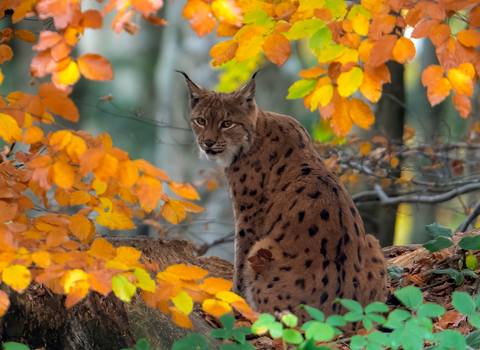
The Missing Lynx Project is a partnership between Northumberland Wildlife Trust, The Lifescape Project and The Wildlife Trusts. The project hosted a touring exhibition in Northumberland, the edge of Cumbria and the border of southern Scotland from March 2024 until Spring 2025 attended by nearly 10,000 visitors. It provided people with the opportunity to find out about this missing mammal, which used to live in Britain but disappeared in medieval times following woodland habitat loss.
The Missing Lynx Project believes that local people’s views matter and it continues to assess communities’ feelings about lynx reintroduction. We would like to thank everyone who visited the exhibition and has contributed so far.
About lynx
Lynx are medium-sized cats with distinctive tufted ears and short tails – similar in size to a slim labrador but with golden fur and black spots. Their big paws allow them to pad silently through their forest home, and even though they are found all over mainland Europe, they are seldom seen and live alone. Once part of the rich mix of wildlife found in our countryside, replacing missing species such as lynx, can help to rebuild a healthy natural world. Nature is currently in crisis and one in six species are at risk of extinction in the United Kingdom.
However, lynx could only be brought back if the conditions are right – there needs to be an area in Britain where lynx have the right natural habitat to survive and somewhere that local people are accepting of the animal back in the landscape.
The Missing Lynx exhibition is our project’s first step in listening to local people’s opinions. Our research has shown that if lynx were to be released into Northumberland they could grow into a healthy and sustainable population. The habitat patch where lynx would be predicted to successfully live covers north-west Northumberland, the edge of Cumbria and into the bordering areas of southern Scotland as the woodland habitat here has recovered. The partnership would support a reintroduction but only if the conditions above are met – and the project is examining those possibilities by opening up the conversation with local people.
Consultation findings
A year-long social consultation has found that 72% of people in the project area of Northumberland, bordering areas of Cumbria and southern Scotland, support potential lynx reintroduction. Lynx used to live in Britain until the medieval period when they died out due to hunting and habitat loss.
The consultation was run by The Missing Lynx Project, led by The Lifescape Project in partnership with Northumberland Wildlife Trust and The Wildlife Trusts. The consultation report provides the initial findings of local people’s attitudes towards lynx reintroduction and their level of support.
Now the project is working with people in the region to discuss how a potential reintroduction could be managed if it were to progress further. The partners are also urging people across the UK to find out more and have their say through a national questionnaire.
Over a thousand people in the project area filled in a detailed questionnaire in the project area. The regional consultation – which is ongoing – included:
- Almost 10,000 visitors attended the touring Missing Lynx exhibition over 103 days
- 100 stakeholder meetings and one-to-one interviews with community, farmers, landowners, foresters and businesses
- 12 workshops were also held 1700 people completed individual questionnaires (of these, 1073 respondents lived in the project region)
The Missing Lynx Project continues to assess communities’ feelings about lynx reintroduction. We would like to thank everyone who visited the exhibition and has contributed so far, we couldn't do it without your involvement!
Find out more, sign up to the newsletter and keep up to date with the latest news on the official Missing Lynx Project website here.
If you would like to contribute to the conversation, please contact us at info@missinglynxproject.org.uk.
The Lifescape Project is leading The Missing Lynx Project, in partnership with Northumberland Wildlife Trust and The Wildlife Trusts.




